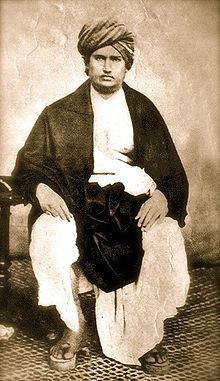Dayananda
Swami Dayananda Saraswati ( Hindi : स्वामी दयानन्द सरस्वती; * 1824 in Tankara, Gujarat , India , † October 30, 1883 in Ajmer , Rajasthan , India) was a reformist scholar of Hinduism .
Life
Dayananda was born into an Orthodox Brahmin family under the name Mula Shankara . Only later did he call himself Dayananda Saraswati. He was a sannyasin , a Hindu ascetic who, while looking for a guru, met Swami Virajananda in Mathura . In 1875 he founded the Arya Samaj , a socio-religious reform movement in Mumbai . Initially not very successful in spreading his teaching - he had previously failed to found comparable movements in other parts of India - the big breakthrough came in 1877/78 during a sermon stay in Panjab. Within a few months, thousands of new members were recruited and local branches of the Arya Samaj were founded in all major cities in the region. During this time, a network was established here that played an important role in the socio-political development of Northwest India, especially after the death of Dayananda Sarasvati. From 1878 there was also an interim collaboration between the Arya Samaj and the Theosophical Society , which expressed itself in the form of the Theosophical Society of the Arya Samaj . In 1882, however, there was a break between the two organizations, as the theosophists rejected Dayananda's claim to the Vedas as the only truth. In his book Satyartha Prakasha , Dayananda makes clear his great distance from Islam and Christianity , which was an essential difference to the approach of the reformer Ram Mohan Roy from the 1820s. He had specifically looked for interfaces between his religion and these traditions.
Teaching
Dayananda wanted to rediscover the pure teaching which he believed was based on the Veda . He criticized the Hinduism of that time, which he regarded as degenerate, above all because of the great importance of the Puranas in everyday religion. He therefore condemned image worship , ancestor worship , pilgrimage , sacrificial cults in temples and sati (widow burning) on the grounds that all these things lacked a Vedic basis. The Arya Samaj was also critical of Brahminism , the caste system , untouchability and child marriage . His goal was a generally accessible religious community of all Hindus on the basis of the Veda. Although Dayananda and the Arya Samaj also had a universal claim to mission towards other religions outside India in this context, these tendencies, in contrast to Vivekananda, did not have any significant impact. The internal political conflicts with Brahmin orthodoxy and competing reform movements among Muslims ( Ahmadiyya ) and Sikhs ( Singh Sabhas ), in which the movement soon found itself entangled, were too intense .
Dayananda based his teaching mainly on the Samaveda , the Rigveda and Yajurveda , but not on the Brahmanas and Upanishads . He advocated the worship of a shapeless God and developed a monotheistic interpretation of the Vedas. He advocated the doctrine of karma , the causality of retaliation of deeds, as well as samsara , the endless cycle of rebirths up to salvation, and emphasized the traditional ideals of Brahmacarin (disciple who lives in chastity) and Samnyasin , who strives for salvation for all get rid of family ties.
He was one of the first Indians to popularize the concept of Svaraj (self-rule, autonomy) during the British colonial rule.
Web links
- Dayananda's main work "Light of Truth" (English)
- Dayananda and Theosophy (English)
| personal data | |
|---|---|
| SURNAME | Dayananda |
| ALTERNATIVE NAMES | Shankara, Mula (maiden name) |
| BRIEF DESCRIPTION | Indian reformist scholar of Hinduism |
| DATE OF BIRTH | 1824 |
| PLACE OF BIRTH | Tankara , Gujarat , India |
| DATE OF DEATH | October 30, 1883 |
| Place of death | Ajmer , Rajasthan , India |
